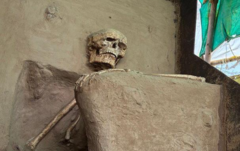In Vadnagar, Gujarat, a remarkable archaeological discovery—a 1,000-year-old skeleton found in a cross-legged, meditative position—has yet to be given a permanent home, despite being unearthed six years ago. Discovered by archaeologist Abhijit Ambekar in 2019, the skeleton has been left in a makeshift tarpaulin shelter while officials argue over its ownership and appropriate museum placement.
Ambekar explains that the skeleton likely dates back to the Solanki period, a dynasty that ruled modern-day Gujarat from 940 to 1300 CE. With its right arm on its lap and the left suspended, it raises questions about ancient burial practices, including the "samadhi burials" where revered individuals were interred rather than cremated. Despite its significance, red tape has left the skeleton vulnerable to weather and local curiosity.
While the Gujarat government has committed to housing archaeological finds from Vadnagar in local museums, the skeleton remains in limbo, causing frustrations among locals and historians alike. As new governmental infrastructures emerge, such as the recently opened Archaeological Experiential Museum that features a large photograph of the skeleton but not the remains themselves, community members are becoming increasingly concerned about the mishandling of their heritage.
Ambekar and his team undertook a meticulous two-month excavation, and although DNA analysis confirmed the skeleton belonged to a man in his forties, ongoing studies are required to unveil more about the ancient population’s lifestyle and diet. While supporters eagerly await the skeleton's exhibition, locals argue that it should not languish outside under inadequate protection.
Calls for bureaucratic efficiency have emerged, with some residents expressing pride in their ancient history yet dismay over the treatment of such a significant artifact. As Vadnagar's archaeological findings continue to draw attention, the legacy of the town and its contributions to history hinge not only on the discoveries but also on how they are preserved for future generations.
Ambekar explains that the skeleton likely dates back to the Solanki period, a dynasty that ruled modern-day Gujarat from 940 to 1300 CE. With its right arm on its lap and the left suspended, it raises questions about ancient burial practices, including the "samadhi burials" where revered individuals were interred rather than cremated. Despite its significance, red tape has left the skeleton vulnerable to weather and local curiosity.
While the Gujarat government has committed to housing archaeological finds from Vadnagar in local museums, the skeleton remains in limbo, causing frustrations among locals and historians alike. As new governmental infrastructures emerge, such as the recently opened Archaeological Experiential Museum that features a large photograph of the skeleton but not the remains themselves, community members are becoming increasingly concerned about the mishandling of their heritage.
Ambekar and his team undertook a meticulous two-month excavation, and although DNA analysis confirmed the skeleton belonged to a man in his forties, ongoing studies are required to unveil more about the ancient population’s lifestyle and diet. While supporters eagerly await the skeleton's exhibition, locals argue that it should not languish outside under inadequate protection.
Calls for bureaucratic efficiency have emerged, with some residents expressing pride in their ancient history yet dismay over the treatment of such a significant artifact. As Vadnagar's archaeological findings continue to draw attention, the legacy of the town and its contributions to history hinge not only on the discoveries but also on how they are preserved for future generations.





















